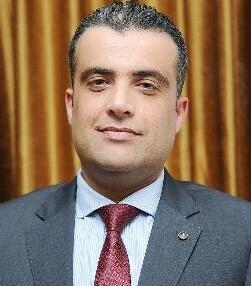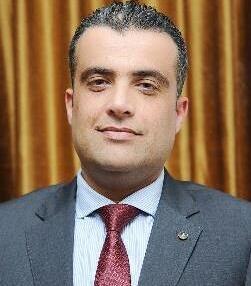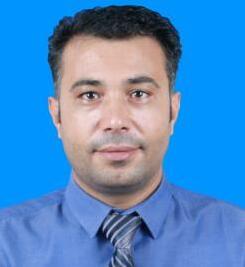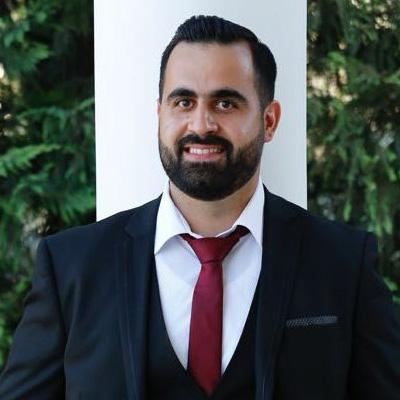
Welcome to the Renewable Energy Engineering Department at Fahad bin Sultan University!
Here, innovation and sustainability converge to shape the future of energy. As you step into our department, you enter a dynamic environment where groundbreaking research, hands-on learning, and real-world applications come together to tackle one of the most pressing challenges of our time: the transition to renewable energy.
Led by esteemed faculty and supported by state-of-the-art facilities, our department is committed to nurturing the next generation of renewable energy leaders. Whether you're passionate about solar, wind, hydro, or emerging technologies, you'll find a rich array of opportunities to explore, innovate, and make a meaningful impact.
Dr. Abdullah E. Alali
Chairman & Associate Professor
About the Department
Established in 2019, the Department of Renewable Energy is a direct response to Saudi Vision 2030's ambitious goals for economic diversification and sustainability. Recognizing the crucial role renewable energy plays in achieving these aims, the department is committed to cultivating a new generation of engineers equipped to lead the nation's green energy transition.
With Vision 2030 setting a target of 50% renewable energy by 2030, our program is tailored to produce graduates who possess the knowledge, skills, and technological expertise to drive this transformation. We provide a comprehensive foundation in renewable energy principles, technologies, and applications, empowering our engineers to contribute to the nation's development, meet the evolving demands of the labor market, and realize the Kingdom's vision for a sustainable future.
Mission
To graduate competent renewable energy engineers who fulfill market needs and are equipped with sound knowledge and research and fundamental skills to:
▪ Be pioneers contributing to the comprehensive sustainable national development plans.
▪ Devote valuable engineering skills and knowledge toward the design, building and running of renewable energy projects.
▪ Support the Kingdome’s efforts to introduce renewable energy as part of its energy mix, aligning with the Saudi Vision 2030.
▪ Work in diverse environments, Embrace lifelong learning, collaborate and lead in multidisciplinary teams.
Program Educational Objectives (PEOs)
The Renewable Energy Engineering program is designed to achieve the following objectives:
PEO1. Graduates will engineer practical renewable-energy and sustainability solutions using broad-based engineering knowledge.
PEO2. Graduates will lead the safe, ethical deployment and management of renewable-energy systems across diverse socio-economic and environmental contexts.
PEO3. Graduates will lead in multidisciplinary teams, communicating clearly, exercising ethical judgment, and demonstrating global awareness.
PEO4. Graduates will engage in research and innovation, and pursue continuous learning and professional growth to adapt to emerging technologies.
Learning Outcomes
A. ABET Student Learning Outcomes (SLOs) and their Performance Indicators (PIs)
|
Student Learning Outcome (SLO) |
Performance Indicator (PI) |
|
1) an ability to identify, formulate, and solve complex engineering problems by applying principles of engineering, science, and mathematics. |
1a- an ability to identify the principles of engineering, science, and mathematics. |
|
1b- an ability to formulate complex engineering problems based on the principles of engineering, science, and mathematics. |
|
|
1c- an ability to apply engineering, science, and mathematics principles to solve complex engineering problems. |
|
|
2) an ability to apply engineering design to produce solutions that meet specified needs with consideration of public health, safety, and welfare, as well as global, cultural, social, environmental, and economic factors. |
2a- an ability to produce a clear needs statement in a design project, identify design problem constraints, and establish criteria for solutions acceptability and desirability. |
|
2b- an ability to evaluate and analyze the economics of an engineering problem solution and to use appropriate analysis techniques to characterize and respond to risks in product or process design. |
|
|
3) an ability to communicate effectively with a range of audiences. |
3- an ability to communicate effectively with a range of audiences. |
|
4) an ability to recognize ethical and professional responsibilities in engineering situations and make informed judgments, which must consider the impact of engineering solutions in global, economic, environmental, and societal contexts. |
4a- an ability to recognize ethical and professional responsibilities in engineering situations. |
|
4b- an ability to evaluate alternative engineering solutions, which consider design conflict issues in economic, environmental, and societal contexts |
|
|
5) an ability to function effectively on a team whose members together provide leadership, create a collaborative and inclusive environment, establish goals, plan tasks, and meet objectives. |
5a- an ability to recognize participants roles in a team setting, fulfill appropriate roles to assure team success, integrate inputs from all team members, and make decisions in relation to objectives criteria. |
|
5b- an ability to monitor team progress and make suggestions accordingly. |
|
|
6) an ability to develop and conduct appropriate experimentation, analyze and interpret data, and use engineering judgment to draw conclusions. |
6a- an ability to show good lab practice and instrumentation skills to measure specific quantities and extract required data.
|
|
6b- an ability to use appropriate tools to analyze data and verify and validate experimental results, while accounting for experimental errors. |
|
|
7) an ability to acquire and apply new knowledge as needed, using appropriate learning strategies. |
7- an ability to express awareness of continuous learning and research, after graduation, and find information relevant to problem solutions without guidance. |
B. NCAAA Program learning Outcomes (PLOs)
|
NCAAA Program learning Outcomes (PLOs) (NQF) |
||
|
Knowledge and Understanding |
||
|
K1 |
Gain knowledge of mathematics, science, and engineering. |
|
|
K2 |
Outline engineering problems solutions based on the principles of physical sciences and mathematics. |
|
|
K3 |
Describe and categorize engineering related contemporary issues. |
|
|
Skills |
||
|
S1 |
Solve engineering problems by applying principles of mathematics, science, and engineering. |
|
|
S2 |
Develop and conduct appropriate experimentation, analyze and interpret data, and use engineering judgement to draw conclusions. |
|
|
S3 |
Apply modern techniques and skills to produce solutions in global, economic, environmental, and societal contexts for engineering practice. |
|
|
S4 |
Acquire and apply life-long learning skills as needed, using appropriate learning strategies. |
|
|
S5 |
Communicate effectively with a range of audiences. |
|
|
Values |
||
|
V1 |
Uphold ethical and professional responsibilities. |
|
|
V2 |
Function and contribute effectively in a team. |
|
C. ABET SLOs-NCAAA PLOs Mapping
|
PIs of ABET (1)-(7) |
1a |
1b |
1c |
2a |
2b |
3 |
4a |
4b |
5a |
5b |
6a |
6b |
7 |
|
NCAAA PLOs |
K1 |
K2 |
S1 |
S3 |
S3 |
S5 |
V1 |
K3 |
V2 |
V2 |
S2 |
S2 |
S4 |
D. POs-NCAAA PLOs Mapping
|
POs |
NCAAA PLOs |
|
PEO1. Graduates will engineer practical renewable-energy and sustainability solutions using broad-based engineering knowledge. |
(K1, K2, S1) |
|
PEO2. Graduates will lead the safe, ethical deployment and management of renewable-energy systems across diverse socio-economic and environmental contexts. |
(S3, K3) |
|
PEO3. Graduates will lead in multidisciplinary teams, communicating clearly, exercising ethical judgment, and demonstrating global awareness. |
(S5, V1, V2) |
|
PEO4. Graduates will engage in research and innovation, and pursue continuous learning and professional growth to adapt to emerging technologies. |
(S2, S4) |
E. POs-ABET SLOs Mapping
|
POs |
ABET SLOs |
|
PEO1. Graduates will engineer practical renewable-energy and sustainability solutions using broad-based engineering knowledge.
|
(1a, 1b, 1c) |
|
PEO2. Graduates will lead the safe, ethical deployment and management of renewable-energy systems across diverse socio-economic and environmental contexts.
|
(2a, 2b, 4b) |
|
PEO3. Graduates will lead in multidisciplinary teams, communicating clearly, exercising ethical judgment, and demonstrating global awareness.
|
(3, 4a, 5a, 5b) |
|
PEO4. Graduates will engage in research and innovation, and pursue continuous learning and professional growth to adapt to emerging technologies.
|
(6a, 6b, 7) |
Curriculum and Program Structure
To graduate with a Bachelor in Renewable Energy Engineering, students must satisfactorily complete 159 credit hours. The distribution of courses is as follows:
University requirements
A total of 37 credit hours of general educational requirements:
▪ 6 credit hours of Arabic: ARAB 101 and ARAB 201;
▪ 15 credit hours of English communication skills: ENGL 100, ENGL 101, ENGL 102,ENGL 203, and ENGL 206;
▪ 7 credit hours of social and cultural studies: SOCS 101, PHE 101, and a free elective course;
▪ 3 credit hours of computing for engineers: IT 100;
▪ 6 credit hours of mathematics: MATH 100 and STAT 100
College requirements
Students in the Renewable Energy Engineering Department are required to complete a total of 40 credit hours in college requirements distributed as follows:
▪ 11 credit hours in sciences: PHYS 101, PHYS 102, PHYS 103L, and CHEM 101/ 101L
▪ 18 credit hours in mathematics and statistics: MATH 101, MATH 102, MATH 201,MATH 202, MATH 215, and STAT 230
▪ 6 credit hours in Engineering Programming: CSC 101 and ELEE 230
▪ 1 credit hour in Engineering Drawings: CIVE 205
▪ 3 credit hours in Engineering Economy: COEN 300
▪ 1 credit hour in Engineering Ethics: COEN 401
Program requirements
Renewable Energy Engineering students must complete 82 credit hours in program requirements including the following 70 core courses:
▪ MECH 225, MECH 230, MECH 342, ELEE 212, ELEE 242, ELEE 350, ELEE 360, ELEE 380,ELEE 480L, ELEE 245L, REE 260, REE 310, REE 320, REE 320L, REE 340, REE 350, REE 400, REE 420, REE 460, REE 420L, REE 460L, REE 470, REE 474, REE 480, REE487, REE 466, REE 498, REE 499,
In addition, Renewable Energy Engineering students must take four electives (12) credit hours from the accepted electives include:
▪ REE 465, REE 471, REE 472, REE 475, REE 476, REE 477, REE 478, REE 479, REE481, REE 482, REE 483, REE 485, REE 486, REE 473, REE 488.
Flow chart of the renewable energy engineering courses (Study plan 2019).

Flow chart of the renewable energy engineering courses (Study plan 2023).

Curriculum and Program Structure
To graduate with a Bachelor in Renewable Energy Engineering, students must satisfactorily complete 159 credit hours. The distribution of courses is as follows:
University requirements
A total of 37 credit hours of general educational requirements:
▪ 6 credit hours of Arabic: ARAB 101 and ARAB 201;
▪ 15 credit hours of English communication skills: ENGL 100, ENGL 101, ENGL 102,ENGL 203, and ENGL 206;
▪ 7 credit hours of social and cultural studies: SOCS 101, PHE 101, and a free elective course;
▪ 3 credit hours of computing for engineers: IT 100;
▪ 6 credit hours of mathematics: MATH 100 and STAT 100
College requirements
Students in the Renewable Energy Engineering Department are required to complete a total of 40 credit hours in college requirements distributed as follows:
▪ 11 credit hours in sciences: PHYS 101, PHYS 102, PHYS 103L, and CHEM 101/ 101L
▪ 18 credit hours in mathematics and statistics: MATH 101, MATH 102, MATH 201,MATH 202, MATH 215, and STAT 230
▪ 6 credit hours in Engineering Programming: CSC 101 and ELEE 230
▪ 1 credit hour in Engineering Drawings: CIVE 205
▪ 3 credit hours in Engineering Economy: COEN 300
▪ 1 credit hour in Engineering Ethics: COEN 401
Program requirements
Renewable Energy Engineering students must complete 82 credit hours in program requirements including the following 70 core courses:
▪ MECH 225, MECH 230, MECH 342, ELEE 212, ELEE 242, ELEE 350, ELEE 360, ELEE 380,ELEE 480L, ELEE 245L, REE 260, REE 310, REE 320, REE 320L, REE 340, REE 350, REE 400, REE 420, REE 460, REE 420L, REE 460L, REE 470, REE 474, REE 480, REE487, REE 466, REE 498, REE 499,
In addition, Renewable Energy Engineering students must take four electives (12) credit hours from the accepted electives include:
▪ REE 465, REE 471, REE 472, REE 475, REE 476, REE 477, REE 478, REE 479, REE481, REE 482, REE 483, REE 485, REE 486, REE 473, REE 488.
Industrial Training
Industrial Training within the Renewable Energy Engineering Department is a crucial component of the curriculum, designed to bridge the gap between theoretical knowledge and real-world applications in the renewable energy sector. This practical training contributes significantly to developing the hands-on experience of students, fostering their professional growth and preparing them for a successful transition into the industry.
All Renewable Energy Engineering students are required to fulfill a 1-credit hour industrial training period of 8 to 12 weeks. This immersive experience provides students with the opportunity to apply their classroom learning in a professional setting, gain exposure to industry best practices, and develop essential skills such as problem-solving, communication, and teamwork.
Industrial training is open to students with senior standing. Students can choose to undertake their training during the summer prior to their final year or during a graduation semester. Training opportunities can be pursued with a variety of organizations, including renewable energy companies, research institutions, government agencies, or non-profit organizations working in the sustainability sector.
During their training, students will work under the supervision of experienced professionals, contributing to ongoing projects or conducting research related to renewable energy technologies. This hands-on experience will not only solidify their understanding of core concepts but also provide them with valuable insights into the challenges and opportunities facing the renewable energy industry.
Template for Summer Internship
Laboratories
Renewable Energy Engineering LABs Policy and Safety Guidelines
1. Renewable Energy Lab
2. Solar Energy Lab
3. Wind Energy Lab
4. Hydrogen Energy Lab
Final Year Project
Final Year Projects (FYPs) within the Department of Renewable Energy Engineering are designed to provide students with the opportunity to apply their accumulated knowledge and skills to a real-world challenge within the field of renewable energy. Students will gain hands-on experience in designing, developing, and implementing innovative solutions related to solar, wind, geothermal, or other sustainable energy technologies.
Before embarking on their FYP, students are required to have completed a minimum of 90 credit hours of the Renewable Energy Engineering program, demonstrating a strong foundation in the core principles of the discipline. Additionally, successful completion of the Fundamentals of Renewable Energy (REE 320) course is essential, ensuring students have a thorough understanding of the key concepts and technologies in renewable energy. Proficiency in Technical Writing (ENGL 206) is also mandatory, enabling students to effectively communicate their research findings and project outcomes in a clear and concise manner.
During the FYP, students will work collaboratively in teams to tackle a specific problem or research question, guided by faculty advisors with expertise in the relevant area. They will be expected to conduct a comprehensive literature review, define project objectives, establish specifications, design and implement their proposed solution, and rigorously evaluate its performance. This process will cultivate critical thinking, problem-solving, and project management skills, preparing students for successful careers in the dynamic and rapidly evolving field of renewable energy.
Program Statistics
|
|
Academic Year |
Enrollment Status |
Enrollment Year |
Total Undergrad |
Total Grad |
Degrees Awarded |
|||||||
|
1st |
2nd |
3rd |
4th |
5th |
Associates |
Bachelors |
Masters |
Doctorates |
|||||
|
Current Year |
2024-2025 |
FT |
39 |
25 |
37 |
45 |
51 |
197 |
0 |
|
|||
|
PT |
- |
- |
- |
- |
- |
- |
|
||||||
|
1 |
2023-2024 |
FT |
25 |
39 |
42 |
44 |
- |
150 |
0 |
|
|||
|
PT |
- |
- |
- |
- |
- |
- |
|
||||||
|
2 |
2022-2023 |
FT |
39 |
38 |
52 |
- |
- |
129 |
0 |
|
|||
|
PT |
- |
- |
- |
- |
- |
- |
|
||||||
|
3 |
2021-2022 |
FT |
32 |
52 |
- |
- |
- |
84 |
0 |
|
|||
|
PT |
- |
- |
- |
- |
- |
- |
|
||||||
|
4 |
2020-2021 |
FT |
52 |
- |
- |
- |
- |
52 |
0 |
|
|||
|
PT |
- |
- |
- |
- |
- |
- |
|
||||||





